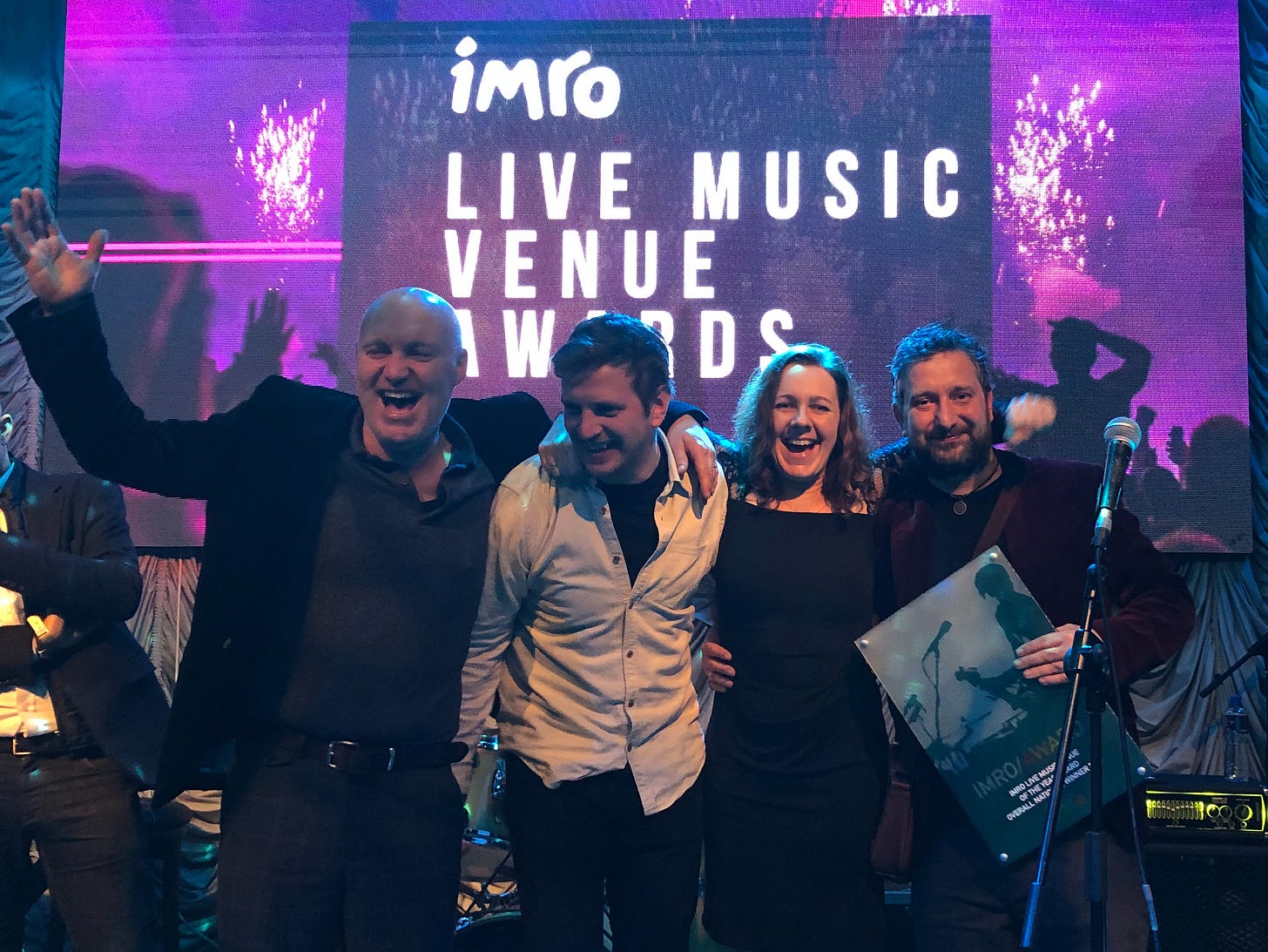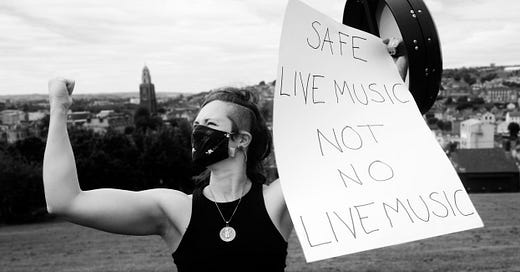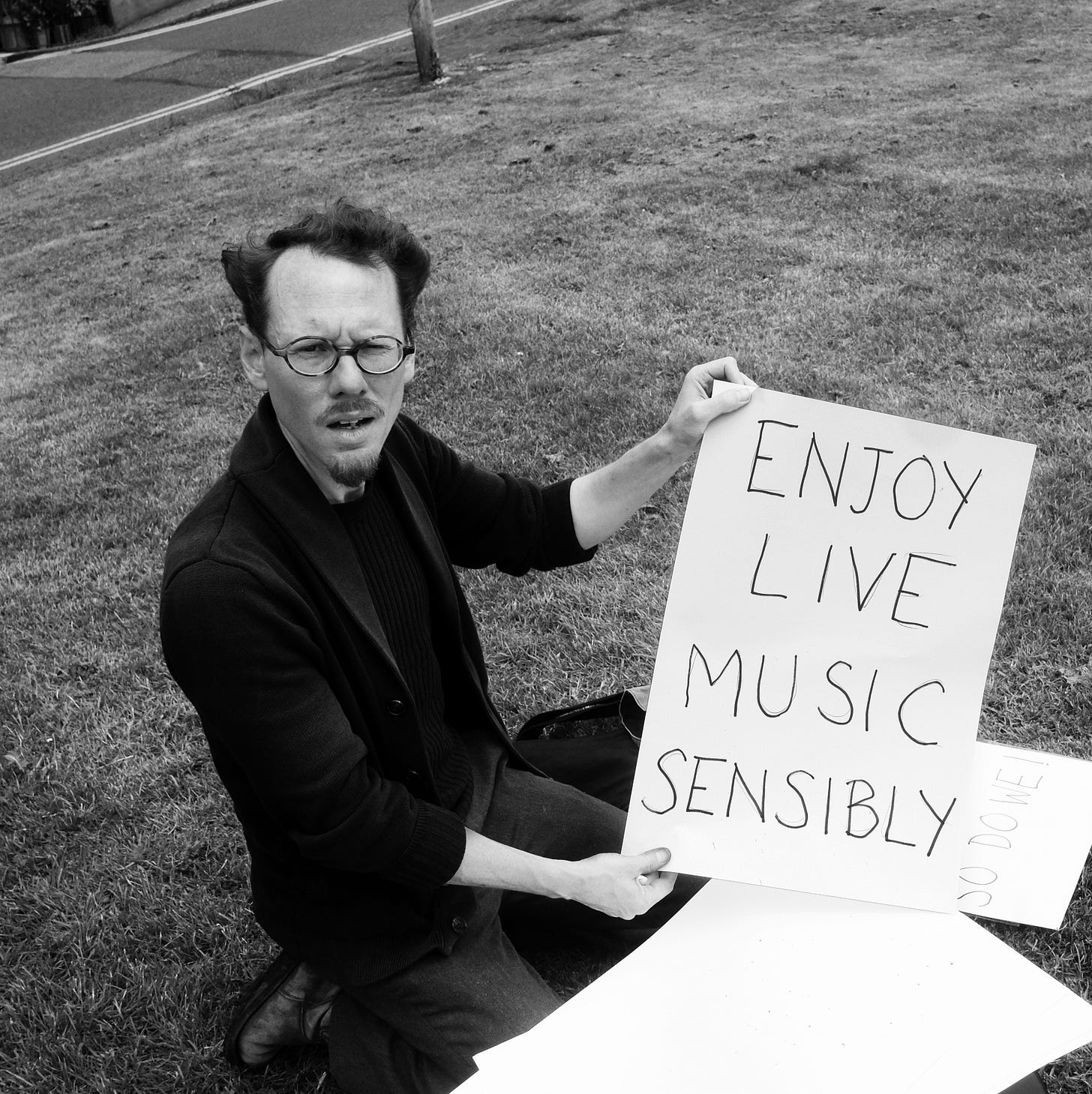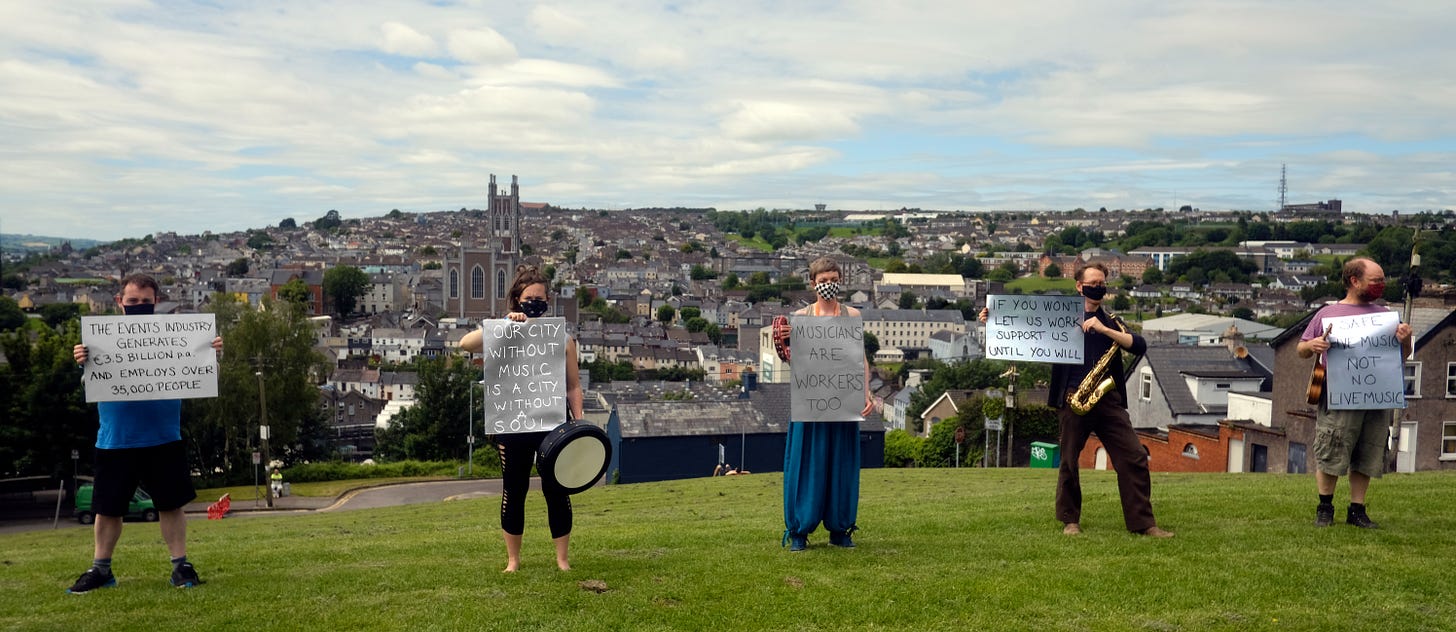Striking up a silence: Cork's musicians are protesting. Here's why.
For 15 months, musicians have been unable to work. Now they're asking for a road-map to recovery.
At noon on Wednesday June 23, in Cork City Centre and in other cities and towns all over the country, musicians, carrying their instruments, will proceed to strike up a silence.
After 15 months of PUP payments and uncertainty about when musicians will be allowed back to work, the final straw was a one-line dictat included in Fáilte Ireland’s guidance for the re-opening of the hospitality industry: “No live or loud music.”
Irish Music Industry Stands Up, a loose affiliation of those objecting to what was perceived as an all-out live music ban was founded on Facebook shortly after, Cork saxophonist Gary Baus explains.
Baus will be a familiar face to many Corkonians: a freelance sax player, he’s a fixture at the Cork Jazz Festival and he plays with many outfits including the Art Crimes band, Mojo Rising and his own Gary Baus quartet. He’s a full-time professional musician: gigs in pubs and other small venues are his lifeblood and his life’s work.
“Musicians were quite angry with the Fáilte Ireland guidelines, mainly because every other sector has some sort of guide on how to safely return to work,” Baus says. “With music, it was just quite simple and blunt: ‘no live or loud music.’ We decided to set up this page to organise a protest about those restrictions.”
The sound of silence
The Irish Music Industry Stands Up (IMISU) Facebook page has 4,500 members and climbing: the silent protests on June 23 will take place in Dublin, Kilkenny, Tralee and other cities and towns. There’s also a nationwide “let us work” petition on the go.
Baus has been instrumental (editor’s note: this pun is awful) in rallying Cork musicians for the rebel city’s iteration, organised through the Cork Music Industry Stands Up Facebook page.
Musicians have always been involved in protest movements, and it may seem intuitive that they should protest by playing, but a vote held by IMISU saw the bulk of musicians opt to protest by not playing.
Armed with their instruments, they’ll assemble, but, as they’ve been doing for the past 15 months, they won’t play.
“By not performing, we’re making a symbolic gesture towards us being locked out of our industry and being silenced,” Baus says. “We want to flip the script.”
“It’s a painful thing, for us not to be able to play. The silence is painful, and we want other people to feel that. We’re going to bring our instruments, but we’re not going to play, and I think that will create the powerful spectacle that we’re looking for, about how emotionally sad we feel, that we can’t play music.”
On top of this symbolic gesture, there’s also the Catch-22 nature of the protest: if musicians are saying that it’s safe for them to practice their art and to get back to work, this message could be undermined if crowds are drawn to what could become a huge outdoor busking session, Baus acknowledges.
“We want to let society and the government know that we take Covid-19 seriously,” he says. “We don’t want to endanger ourselves or others at a protest, or eventually, when we get back to work. We know that if we were to put on live music as part of a protest, it could descend into people breaking the rules or getting drunk or messy, and actually, that would hurt our message. “
Test gigs, testing what?
When James Vincent McMorrow performed in Iveagh Gardens to an audience of 500 on June 10, it was billed in the press as “live music returns to Ireland.” And from the perspective of the gig-starved punter at the consumption end, this might very well appear to be the case, despite the awkward social distancing procedures in place, and despite a choice of social lubricants restricted to ice cream or a crepe.
It was the first of a series of “pilot live events” funded by the Department of Tourism, Culture, Arts, Gaeltacht, Sport and Media.
Press photos from the Department of Arts funded gig eerily replicated the familiar beautiful-people-at-festivals-in-their-gladrags pics that usually dominate our front pages all summer.
But many were asking - if this was a test gig, what exactly was it testing?
When two UK test “club nights” were held in Liverpool at the end of April, clubbers took Covid tests beforehand, and there were no masks or distancing restrictions at the events. By the end of May, it was possible for the English city’s public health director to announce that there had been no detectable spread of the virus as a result.
But, while antigen tests were originally planned for the Irish “test gigs,” this did not take place, seemingly due to antigen testing resistance within NPHET.
So what are the “test gigs” actually testing? They’re not testing whether it’s safe to hold gigs in normal gig conditions. And, with the Department of Tourism, Culture, Arts, Gaeltacht, Sport and Media (TCAGSM) footing a bill of €90,000 for the 500 capacity event according to one source, it certainly isn’t testing the financial viability of socially distanced gigs.
For Baus and others, the message behind the pilot events - that live music has returned - is not reflective of the reality. While there may be a handful of high-profile acts out there, the vast bulk of Irish musicians are session musicians, pub musicians, wedding performers….everyone the Failte Ireland guidance impacts, who will not be amongst the select few playing to thousands on large stages.
“I think that when the government think about live music, they think about live entertainment and huge international acts that fill stadiums,” Baus, who was born in the US but is now a naturalised Irish citizen, says. “That’s a part of our industry, but the real life-blood of this country in terms of music is the people that perform every weekend in pubs.”
“I’ve never lived in any other country that had such a tradition of live music, such an appreciation for live music. It’s almost like a necessity when you want to experience Irish culture. So it’s a real shame that it seems the government doesn’t understand where the majority of live music actually happens: that’s in smaller venues. We’re also the ones that are probably the lowest paid and most exploited. The people who actually need help, and a road-map back to gigging safely, are our local musicians. So the people that really need the help aren’t getting it.”
Baus has been surviving on the lowest PUP band of €203 for the past 15 months. He says he’s lucky compared to many he knows.
“We had lots of people with mortgages, children, who were operating as self-employed sole traders,” he says. “Those people are going through a terrible crisis right now that’s lasted over a year and I just feel lucky: I’m single and I don’t have children, but I’m barely keeping my head above water. I really feel for the musicians who have other little humans to take care of.”
Wellbeing, and not being able to perform for 15 months
Almost more than any other profession, musicians’ identities are formed by their work. For Baus, as for so many others, the hurt is not only to the wallet: it’s well-documented that long periods of unemployment, for anybody, are connected to a host of physical and mental health risks, but on top of that, for musicians, not being able to perform can constitute something of an existential crisis.
“I’ve never existed on planet earth without playing music: I never knew what life was like when I was not able to do it,” Baus says. “I really struggled. I didn’t know who I am without it. I’m really glad that I was able to still practice at home and to stay creative, but a lot of what we do is performance.”
“It just gives you so much joy, to spread that much joy, and it helps me in immeasurable ways that I now understand in terms of my own mental health, and even physical fitness.”
Where did the Fáilte Ireland guidelines come from?
Baus takes issue with what seems to be the chain of events surrounding Fáilte Ireland’s live music ban. Why didn’t the Department of TCAGSM, headed up by Green Party Minister Catherine Martin, which has been distributing as much largesse as it can muster in the form of a variety of acronymic supports and schemes - MISP, MEBAS and now LPSS - step in and advocate for that overwhelming majority of musicians, ask NPHET to re-evaluate the situation?
“I think it’s very telling that they used the phrase ‘previous guidance,’” Baus says. “I don’t know for sure, but I think we can assume that they did not ask NPHET to reevaluate the situation: what was the rate of infection, the rate of vaccination, is there a possibility to reevaluate the live music ban because we’re in a better situation?”
I emailed Minister Martin’s department. Her press officer confirmed to me that TCAGSM acted as go-between for Fáilte Ireland and NPHET, but have not proactively sought a review of the advice on live music: “Fáilte Ireland liaises with this Department to ensure the guidelines keep abreast of the latest central decisions,” the PR officer said in an email.
“Updated public health advice prepared by NPHET is considered as part of the Government’s decision-making process regarding the easing of public health restrictions. There has been no update to the advice relating to music or live music in hospitality settings.”
No musician stakeholders
TCAGSM repeatedly points out to its consultations with “stakeholders.” A “Return to Live Entertainment Working Group” founded by Martin lists the following stakeholders: “City and County Managers Association (CCMA), the Department of Housing, Local Government and Heritage, Theatre Forum, Fáilte Ireland, Events Industry Alliance, Eamonn O'Boyle and Associates, Aiken Promotions, Live Venue Collective, Events Industry Association Ireland, Independent Producers Forum, EPIC , Arts Council, Venue Operators Forum and Department officials.”
I can see plenty of venues and events people on that list. I can’t see a single musician or musician’s union. I followed up to ask who was providing the musician’s perspective. I got no reply.
Baus says this is problematic: those who have been able to organise and lobby have been treated well.
“The life-blood of the music industry hasn’t been represented in this,” he says. “I think we’ve been treated very poorly and have gone unrecognised for long enough.”
Live Performance Support Scheme
A whopping €25 million Live Performance Support Scheme (LPSS) announced by TCAGSM this week, with many Cork city and county recipients, it’s hoped, will begin to provide employment for musicians towards the end of the summer.
The LPSS, half of an overall €50 million package for 2021, is being distributed to 237 venues, events organisers and production companies with the express intent of applying a “trickle down” effect: musicians, as well as the very many techies and crew that have also been out of work, will benefit.
Edel Curtin agrees, but she also thinks the LPSS announcement, without revoking the Fáilte Ireland advice, is confusing: she hopes the Fáilte Ireland advice will be lifted soon.
Curtin runs Coughlan’s of Douglas street, as well as operating as a promoter for several other events in Cork. She’s also is the spokesperson for the Live Venue Collective, a lobbying group representing small, quality venues nationwide and including, in Co Cork, Connolly’s of Leap and De Barra’s of Clonakilty.
Coughlan’s has received €131,000 of LPSS funding.
Curtin will be using the money for a series of outdoor gigs in August, as well as the music festival she runs each September.

“We’re going to be able to have lots of local artists, and some of the people that would have played with us before,” Curtin says.
“Coughlan’s Promotions, which is a separate company, will be putting on a festival in Ballinacurra House in September, too.”
The LPSS funding is designed ensure venues and promoters are confident to take a risk again, Curtin explains
“None of us believe we’ll be at full capacity in September,” she says. “A 400-seater venue might only be able to have 100 or 150 people indoors, and that means the gig makes no financial sense to do, but the funding means that everyone can get paid without the venue losing money, basically. It subsidises our costs.”
With the LPSS applications in April, and funding announcements made this week, and a deadline of September for all 237 organisations to stage their events, Curtin says it’s now going to become a mad scramble to book acts: some musicians will have phones constantly hopping in the coming weeks.
“Everyone’s going to be clambering to get musicians and crew,” she says. “It’s a shame, because extending the timeframe to October would have spread the money further. But everyone in the Live Venues Collective did get funding, so we’re delighted.”
So while Fáilte Ireland advice is an all-out ban on live music, a large array of small venues are currently in the process of booking live gigs. Isn’t this contradictory?
“It’s actually very confusing,” Curtin says. “My interpretation is that in Coughlan’s bar at the minute, I can’t just have a two-piece out playing to punters while they’re having their drinks. But if I were to have a ticketed event, I would be allowed to have whatever the capacity currently is. If it’s ticketed, you can have an outdoor gig for 100 people. But it has to be a cultural event: you can’t have live music in a pub, which doesn’t make any sense, but that’s the way it is at the moment.”
Curtin wants the Fáilte Ireland advice lifted, not only for the musicians, but also for the venues.
“I can understand the government’s concern, but I think there has to be a bit more trust of the people involved in putting on the gigs, whether that’s a pub covers band or a ticketed event,” she says. “I think they need to realise that our job in music venues and pubs, way before Covid, was to make sure everyone is safe. That was always our job, whether that’s stopping people from having another drink when they’re too drunk, or stopping people falling on top of each other at gigs, providing security. I think they’ve forgotten that.”
For Baus and his fellow musicians planning their silent protest next Wednesday, there isn’t the confidence there that the trickle-down impacts of TCAGSM’s €25 million largesse will be felt by all performers equally, unless the Fáilte Ireland guidelines are revoked.
“It highlights the contradictions of the Fáilte Ireland restrictions by allowing only these certain events,” Baus says. At the end of the day, we still need the Fáilte Ireland live music ban to be lifted. Only a select few will be lucky enough to get employment through those venues. The majority of gigging musicians are still screwed.”
Cork Music Industry Stands Up will be holding a silent protest on Grand Parade, Cork at 12 noon on the 23rd of June. Non-musician supporters are welcome.






